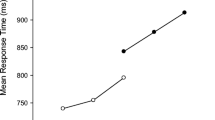Abstract
The present paper describes the single-case of a patient presenting acalculia with preserved arithmetic facts but impaired procedural knowledge, being unable to resolve mental or written complex calculations. The implications of these findings are discussed in the context of the different theoretical models that have been proposed for the cognitive mechanisms underlying calculation skills.



Similar content being viewed by others
References
McCloskey M, Caramazza A, Basili A (1985) Cognitive mechanisms in number processing and calculation: evidence from dyscalculia. Brain Cogn 4:171–196
McCloskey M, Aliminosa D, Sokol SM (1991) Facts, rules and procedures in normal calculation: evidence from multiple single-patient studies of impaired arithmetic fact retrieval. Brain Cogn 17:154–203
McCloskey M (1992) Cognitive mechanisms in numerical processing: evidence from acquired dyscalculia. Cognition 44:107–157
Dehaene S (1992) Varieties of numerical abilities. Cognition 44:1–42
Dehaene S, Cohen L (1995) Towards an anatomical and functional model of number processing. Math Cogn 1:83–120
Dehaene S, Cohen L (1997) Cerebral pathways for calculation: double dissociation between rote verbal and quantitative knowledge of arithmetic. Cortex 33:219–250
Dehaene S, Piazza M, Pinel P, Cohen L (2003) Three parietal circuits for number processing. Cogn Neuropsychol 20:487–506
Delazer M (2003) Neuropsychological findings on conceptual knowledge of arithmetic. In: Baroody AJ, Dowker A (eds) The development of arithmetic concepts and skills. Lawrence Erlbaum Associates, Mahwah, pp 385–408
Sokol SM, McCloskey M (1991) Cognitive mechanisms in calculation. In: Sternberg RJ, Frensch PA (eds) Complex problem solving: principles and mechanisms. Lawrence Erlbaum Associates, Hillsdale, pp 85–116
Hatano G (1988) Social and motivational bases of mathematical understanding. In: Saxe GB, Gearhart M (eds) Children’s mathematics. Jossey-Bass, San Francisco, pp 55–70
Warrington EK (1982) The fractionation of arithmetical skills: a single case study. Q J Exp Psychol 34A:31–51
Hittmair-Delazer M, Semenza C, Denes G (1994) Concepts and facts in calculation. Brain 117:715–728
Caramazza A, McCloskey M (1987) Dissociations of calculation process. In: Deloche G, Seron X (eds) Mathematical disabilities: a cognitive neuropsychological perspective. Lawrence Erlbaum Associates, Hillsdale, pp 231–234
Grafman J, Kampen D, Rosenberg J et al (1989) The progressive breakdown of number processing and calculation ability: a case study. Cortex 25:121–133
Lucchelli F, De Renzi E (1993) Primary dyscalculia after a medial frontal lesion of the left hemisphere. J Neurol Neurosurg Psychiatry 56:304–307
Cipolotti L, Butterworth B, Warrington EK (1994) From “one thousand nine hundred and forty-five” to 100.945. Neuropsychologia 32:503–509
Girelli L, Delazer M (1996) Subtraction bugs in an acalculic patient. Cortex 32:547–555
Sandrini M, Miozzo A, Cotelli M et al (2003) The residual calculation abilities of a patient with severe aphasia: evidence for a selective deficit of subtraction procedures. Cortex 39:85–96
Semenza C, Miceli L, Girelli L (1997) A deficit for arithmetical procedures: lack of knowledge or lack of monitoring? Cortex 33:483–498
McNeil JE, Burgess PW (2002) The selective impairment of arithmetical procedures. Cortex 38:569–587
Granà A, Hofer R, Semenza C (2006) Acalculia from a right hemisphere lesion. Dealing with “where” in multiplication procedures. Neuropsychologia 44:2972–2986
Van Lehn K (1982) Mind bugs. The origin of arithmetical misconceptions. MIT Press, Cambridge
Whitaker H, Habiger J, Ivers R (1985) Acalculia from a lenticular-caudate lesion. Neurology 35(suppl 1):161
Delazer M, Domahs F, Lochy A et al (2004) Number processing and basal ganglia dysfunction: a single case study. Neuropsychologia 42:1050–1062
Corbett AJ, McCusker EA, Davidson OR (1988) Acalculia following a dominant-hemisphere subcortical infarct. Arch Neurol 43:964–966
Cohen L, Dehaene S (1996) Cerebral networks for number processing: evidence from a case of posterior callosal lesion. Neurocase 2:155–174
Hartje W (1987) The effect of spatial disorders on arithmetical skills. In: Deloche G, Seron X (eds) Mathematical disabilities: a cognitive neuropsychological perspective. Lawrence Erlbaum Associates, Hillsdale, pp 121–125
Acknowledgments
The author wishes to thank to Prof. Klaus Willmes-von Hinckeldey, Elise Klein and two anonymous reviewers for their helpful comments and suggestions.
Author information
Authors and Affiliations
Corresponding author
Rights and permissions
About this article
Cite this article
Rosca, E.C. A case of acalculia due to impaired procedural knowledge. Neurol Sci 30, 163–170 (2009). https://doi.org/10.1007/s10072-009-0029-7
Received:
Accepted:
Published:
Issue Date:
DOI: https://doi.org/10.1007/s10072-009-0029-7




